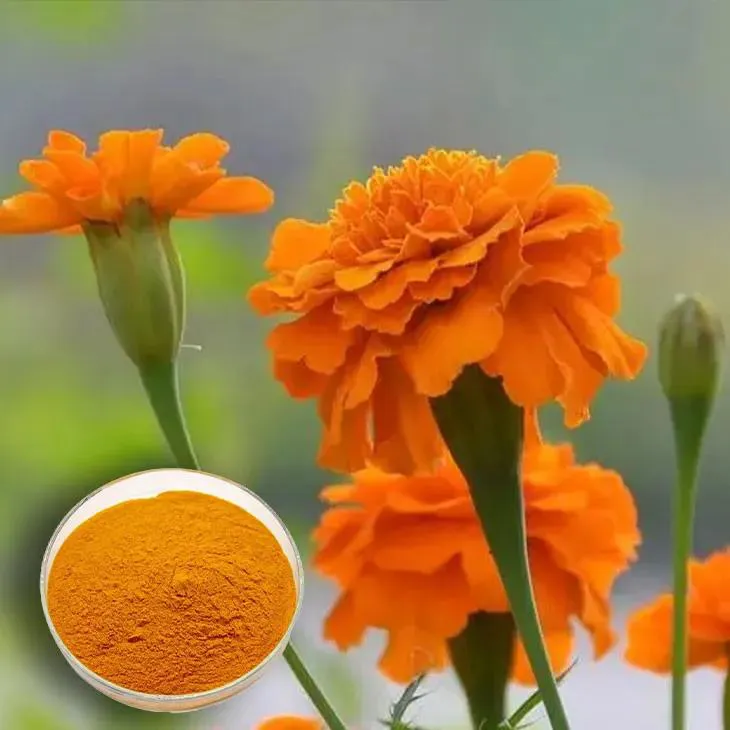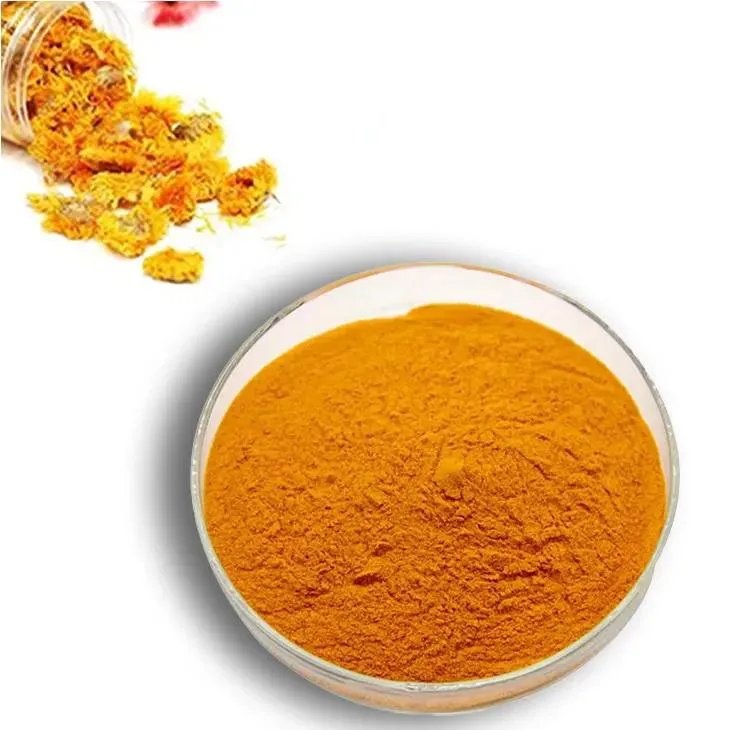- 0086-571-85302990
- sales@greenskybio.com
The Side Effects of Marigold Extract: A Detailed Insight
2025-03-23

Marigold Extract, derived primarily from the Calendula officinalis plant, is widely recognized for its myriad of therapeutic properties, including anti-inflammatory, antioxidant, and antimicrobial effects. Used traditionally across cultures, Marigold Extract has found its way into modern herbal medicine, beauty products, and dietary supplements. Despite its popularity and the general assumption of its safety, it's crucial to be aware that Marigold Extract, like any other supplement, may come with potential side effects and considerations for use. This article delves into the known side effects of marigold extract, providing detailed insights to help consumers navigate its use safely.
Understanding Marigold Extract
Marigold extract is rich in beneficial compounds like flavonoids, saponins, and carotenoids. These constituents contribute to its therapeutic action, making it a go-to remedy for skin issues, gastrointestinal discomfort, and wound healing. Typically used topically and orally, marigold extract is praised for its capacity to accelerate recovery, promote health, and provide relief from various ailments. However, as with all herbal treatments, it is essential to recognize both the benefits and the risks associated with its use.

Potential Side Effects
1. Allergic Reactions
One of the most common adverse effects linked to marigold extract is allergic reactions, particularly in individuals sensitive to plants in the Asteraceae family, which includes daisies, ragweed, and marigolds. Symptoms may manifest as skin irritation, rash, itching, or redness when used topically. In some cases, ingesting marigold extract can lead to allergic reactions such as swelling of the lips, tongue, or throat, difficulty breathing, and anaphylaxis—a severe, life-threatening condition that requires immediate medical attention.
2. Skin Sensitivity
While marigold extract is generally considered beneficial for the skin, some individuals may experience heightened skin sensitivity with prolonged use. This could result in increased susceptibility to sunburn, dryness, or irritation, especially when marigold-infused products are applied before sun exposure. It is advised to use sunscreen or protective clothing if using marigold extract on the skin, particularly during peak sun hours.
3. Gastrointestinal Upset
Ingesting marigold extract may sometimes result in gastrointestinal discomfort, including nausea, vomiting, or diarrhea. While these symptoms are typically mild and temporary, they could indicate that the body's tolerance to marigold is lower, warranting discontinuation or adjustment of dosage. Consuming marigold extract with food or water may alleviate such symptoms.
4. Potential Interactions with Medications
Marigold extract could interact with certain medications, altering their efficacy or causing undesirable side effects. It may enhance the sedative effects of central nervous system depressants, such as sleep aids or tranquilizers, increasing drowsiness or lethargy. Furthermore, marigold extract could exacerbate the effects of anti-diabetic drugs, potentially resulting in hypoglycemia. Consulting a healthcare professional before using marigold extract in conjunction with prescribed medications is crucial to prevent adverse interactions.
5. Pregnancy and Breastfeeding
Although marigold extract is often included in skincare products, its oral use may not be recommended during pregnancy and breastfeeding. Due to limited research on its safety profile in these conditions, potential risks to fetal development or nursing infants cannot be conclusively ruled out. Pregnant or lactating individuals are advised to consult their healthcare provider before considering marigold extract for internal use.
6. Hormonal Effects
Some studies suggest that marigold extract may exhibit hormonal effects, potentially affecting estrogen levels. This could be significant for individuals with hormone-sensitive conditions such as breast or ovarian cancer and for those undergoing hormone replacement therapies. Thorough consultation with a medical professional is recommended for anyone concerned with hormonal balance when considering marigold extract.

Considerations for Safe Use
Before incorporating marigold extract into your health regimen, take the following considerations into account:
- Patch Testing: Conduct a patch test on a small area of skin before applying marigold extract topically to check for sensitivity or allergic reactions.
- Dosage Control: Adherence to recommended dosages on product labels can prevent gastrointestinal discomfort and other side effects.
- Personal Health Profile: Individuals with allergies, chronic health conditions, or those undergoing specific medical treatments should seek medical advice before using marigold extract.
- Product Selection: Opt for high-quality marigold extract products from reputable manufacturers, ensuring purity and consistent potency.

Conclusion
Marigold extract offers numerous benefits that make it a valuable addition to natural health and wellness practices. Nevertheless, understanding its potential side effects is essential to ensure safe and effective use. By being aware of how marigold extract might interact with individual health conditions or medications, users can make informed choices that maximize the therapeutic benefits while minimizing potential risks. As with all herbal remedies, responsible use involves considering professional guidance to tailor its use to your unique health needs, thereby promoting safer and more personalized wellness journeys.
- ▶ Hesperidin
- ▶ citrus bioflavonoids
- ▶ plant extract
- ▶ lycopene
- ▶ Diosmin
- ▶ Grape seed extract
- ▶ Sea buckthorn Juice Powder
- ▶ Beetroot powder
- ▶ Hops Extract
- ▶ Artichoke Extract
- ▶ Reishi mushroom extract
- ▶ Astaxanthin
- ▶ Green Tea Extract
- ▶ Curcumin Extract
- ▶ Horse Chestnut Extract
- ▶ Other Problems
- ▶ Boswellia Serrata Extract
- ▶ Resveratrol Extract
- ▶ Marigold Extract
- ▶ Grape Leaf Extract
- ▶ blog3
- ▶ blog4
- ▶ blog5
-
Is marigold good for inflammation?
2025-03-23
-
Are marigolds safe for human consumption?
2025-03-23
-
7 Benefits of Marigolds
2025-03-23
-
Is Marigold Extract Good for Your Eyes?
2025-03-23
-
What Is Marigold Extract Used For?
2025-03-23
-
Red Wine Extract
2025-03-23
-
Tormentil Extract
2025-03-23
-
Astaxanthin
2025-03-23
-
Beetroot juice Powder
2025-03-23
-
Oyster Mushroom Extract Powder
2025-03-23
-
Fenugreek Extract Powder
2025-03-23
-
Peppermint Oil
2025-03-23
-
Pine bark Extract Powder
2025-03-23
-
Mangosteen extract powder
2025-03-23
-
Kelp Extract Powder
2025-03-23






























